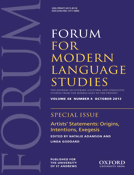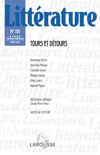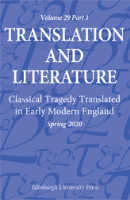
Acta Universitatis Lodziensis Folia Litteraria Romanica
Scope & Guideline
Elevating Scholarship Through Open Access Excellence
Introduction
Aims and Scopes
- Literary Analysis and Criticism:
The journal focuses on in-depth literary analysis, exploring various texts from different historical periods and cultural contexts. This includes examining narrative techniques, thematic concerns, and character development. - Interdisciplinary Approaches to Literature:
It encourages interdisciplinary research that integrates perspectives from history, sociology, psychology, and cultural studies, thus enriching the understanding of literary works. - Translation Studies:
The journal addresses the complexities of translation, particularly in relation to cultural exchange and the impact of translation on literary reception. - Emotional and Psychological Dimensions in Literature:
A significant focus is placed on the exploration of emotions within literary texts, including how these emotions are expressed and perceived in different cultural contexts. - Historical Contextualization of Literary Works:
The journal emphasizes the importance of historical context in understanding literature, including the social, political, and cultural factors that influence literary production.
Trending and Emerging
- Emotional and Affective Discourse:
Recent publications have increasingly explored the language of emotions and affect, indicating a trend towards understanding how emotional expressions shape narrative and cultural contexts. - Contemporary Reinterpretations of Classic Texts:
There is a growing trend of re-examining classical literature through modern lenses, including feminist, post-colonial, and psychological perspectives, which reflects an evolving understanding of these texts. - Crisis and Trauma in Literature:
An emerging focus on themes of crisis and trauma, particularly in relation to socio-political contexts and historical events, has gained traction, highlighting literature's role in processing collective experiences. - Intermediary Forms and Adaptations:
The journal has seen an increase in studies focusing on adaptations across media, such as literature's influence on film and theater, showcasing the fluidity of narratives across different platforms. - Explorations of Identity and Cultural Memory:
Recent works increasingly address themes of identity, memory, and cultural heritage, reflecting broader societal discussions about diversity and representation in literature.
Declining or Waning
- Traditional Linguistic Studies:
While foundational linguistic studies remain important, there has been a noticeable decline in papers focused exclusively on traditional linguistic analysis without interdisciplinary connections, as the journal shifts towards more integrated approaches. - Historical Literary Genres:
Research specifically centered on traditional historical genres has decreased, possibly due to the growing interest in contemporary literature and modern theoretical frameworks. - Static Cultural Studies:
There seems to be a waning interest in static cultural studies that do not engage with dynamic cultural processes or contemporary relevance, as the journal increasingly seeks to address current societal issues through literature.
Similar Journals

Romanica Olomucensia
Connecting Scholars Through Open Access ExcellenceRomanica Olomucensia is a distinguished open-access academic journal published by Palacky University, Department of Romance Philosophical Faculty in the Czech Republic. With its commitment to fostering advanced research in the fields of Literature and Literary Theory as well as Linguistics and Language, this journal aims to provide a platform for scholars, researchers, and students to share their findings and insights. Since its inception, Romanica Olomucensia has consistently been recognized for its quality, securing a position in the Q2 category in the literature domain and achieving a Q3 ranking in linguistics per the 2023 category quartiles. The journal is indexed in Scopus, reflecting its standing in the academic community, with impressive ranks in various arts and humanities disciplines. It has been an open-access journal since 2018, promoting unrestricted access to all its publications, thus enhancing global academic outreach. With a focus on innovation and interdisciplinary studies, Romanica Olomucensia serves as an essential resource for anyone interested in the dynamic interplay of language and literature.

FORUM FOR MODERN LANGUAGE STUDIES
Fostering Scholarly Dialogue on Language and LiteratureFORUM FOR MODERN LANGUAGE STUDIES is a prestigious academic journal published by Oxford University Press that has been serving the fields of literature and linguistics since its inception in 1965. This journal, with an ISSN of 0015-8518 and an E-ISSN of 1471-6860, plays a crucial role in advancing scholarly discourse on modern language studies, including literature and literary theory. With an impactful presence in both the linguistic and literary domains, it has been recognized in 2023 with a category ranking of Q2 in Literature and Literary Theory and Q3 in Linguistics and Language. It stands out in the competitive landscape, holding a notable position within Scopus rankings, including a 70th percentile ranking in Literature & Literary Theory. While the journal currently does not offer open access options, it remains a vital resource for researchers, educators, and students passionate about the transformative power of language and literature. Its commitment to quality research and robust academic discussion underscores its importance, making it a key platform for those aiming to contribute to modern language scholarship.

GERMANISCH-ROMANISCHE MONATSSCHRIFT
Illuminating the Complexities of Linguistic HeritageGERMANISCH-ROMANISCHE MONATSSCHRIFT, published by UNIVERSITATSVERLAG C WINTER HEIDELBERG GMBH, is a vital academic journal dedicated to the fields of linguistics, literature, and literary theory. With its ISSN 0016-8904, this journal fosters scholarly discussions and disseminates innovative research that intersects Germanic and Romance languages and literatures. While it does not currently offer Open Access options, its contributions have positioned it within the Q4 quartile in both Linguistics and Language, and Literature and Literary Theory according to the 2023 category rankings. The journal's Scopus ranking reflects its emerging place within the academic community, situated at the 40th percentile for Literature and Literary Theory, and the 20th and 18th percentiles within Language and Linguistics, respectively. Scholars and students are encouraged to engage with this resource as it offers a platform for new perspectives that are pivotal to understanding the complex interrelations of these linguistic traditions, enriching both teaching and research initiatives.

World Literature Studies
Fostering Scholarly Excellence in Literary StudiesWorld Literature Studies is a leading academic journal published by the Institute of World Literature at the Slovak Academy of Sciences, dedicated to advancing the field of literary studies. With an ISSN of 1337-9275 and an E-ISSN of 1337-9690, this journal has established itself as a prominent platform for scholarly research and discourse, earning a prestigious Q1 ranking in the Literature and Literary Theory category as of 2023, placing it in the top 25% of journals in its field according to Scopus metrics. Operating from Slovakia, the journal caters to a global audience, highlighting diverse perspectives in world literature and fostering interdisciplinary collaboration. Though it currently offers no Open Access option, it maintains a rigorous peer-review process that ensures the quality and integrity of published works. Researchers, students, and literary professionals alike will find the journal's comprehensive articles and critical analyses essential for staying informed about the latest developments and trends in literature and literary theory.

LITTERATURE
Transforming the Landscape of Literary Studies.LITTERATURE is a distinguished academic journal published by LAROUSSE, dedicated to the exploration and critical discourse of literary studies. Based in France, this journal, with ISSN 0047-4800 and E-ISSN 1958-5926, serves as a vital platform for scholars, students, and professionals interested in both contemporary and historical literary theory. Despite its current categorization in the Q4 quartile of literature and literary theory for 2023, LITTERATURE aspires to elevate discussions within the field, providing a peer-reviewed environment for innovative research and theoretical exploration. The journal covers an extensive range of topics, including literary criticism, narrative theory, and cultural studies, ensuring it remains relevant in an evolving academic landscape. With an unwavering commitment to fostering scholarly communication, LITTERATURE invites contributions that challenge conventional perspectives and push the boundaries of literary analysis, aiming to bridge the gap between academic scholarship and broader societal narratives.

Studi Slavistici
Cultivating Knowledge Across Slavic DisciplinesStudi Slavistici is an esteemed academic journal published by FIRENZE UNIV PRESS, focusing on the rich and diverse fields of Cultural Studies, Linguistics and Language, and Literature and Literary Theory. Since its initiation in 2004, it operates under an Open Access model, providing unrestricted access to its contents and fostering a wider dissemination of research. Based in Italy, this journal serves as a vital platform for scholars and researchers engaged in Slavic studies and beyond, encouraging interdisciplinary dialogue and innovative approaches. With its current Quartile rankings in the Q4 category across various domains, it plays a significant role in shaping dialogues within the academic community while offering insights into contemporary and historical perspectives. By maintaining an inclusive vision and engaging with critical issues, Studi Slavistici remains dedicated to advancing knowledge and scholarship in these intricate fields.

Literature Compass
Unraveling the Complexities of Text and ContextLiterature Compass, published by WILEY, is an esteemed journal in the field of Literature and Cultural Studies, reflecting a robust commitment to advancing scholarly discourse since its inception in 2004. With an impressive Q1 ranking in Literature and Literary Theory and a Q2 ranking in Cultural Studies as of 2023, the journal stands out as a critical resource for researchers, professionals, and students alike, offering insights into contemporary literary analysis and cultural critique. While not operating as an open access journal, it provides a wealth of peer-reviewed articles that delve into the complexities of literature and its societal implications. The journal’s unique aim is to bridge diverse literary topics, facilitating a holistic understanding of narrative forms and their cultural contexts. As part of a prestigious academic tradition, Literature Compass is published from the United Kingdom and serves as a vital platform for intellectual exchange in an increasingly interconnected world.

NEOPHILOLOGUS
Illuminating Insights in Linguistics and Literary DiscourseNEOPHILOLOGUS, published by Springer, stands as a pivotal journal in the fields of Linguistics and Language as well as Literature and Literary Theory. With an illustrious history dating back to 1916 and continuing through various phases until 2024, this journal has entrenched itself as a crucial platform for scholarly discussion and research dissemination. NEOPHILOLOGUS is recognized for its high academic standards, as evidenced by its impressive category quartiles, ranking in the Q2 tier for Linguistics and Language and Q1 for Literature and Literary Theory as of 2023. Notably, it ranks in the 81st percentile for Arts and Humanities in the Scopus database, underscoring its significant contribution to the humanities discourse. While the journal does not currently offer open access options, it remains a valuable resource for researchers, professionals, and students seeking in-depth analyses and insights within its specialized domains. Based in Dordrecht, Netherlands, NEOPHILOLOGUS invites contributions that advance our understanding of linguistic and literary phenomena, ensuring its relevance and impact in these dynamic fields.

Translation and Literature
Bridging Cultures Through Literary TranslationTranslation and Literature is a leading academic journal published by Edinburgh University Press, focusing on the intricate relationship between language and literature within the realms of translation studies. With an ISSN of 0968-1361 and an E-ISSN of 1750-0214, this journal provides a crucial platform for scholars and practitioners to explore and disseminate research that addresses both the theoretical and practical aspects of translation. Since its inception in 1996, Translation and Literature has established itself as an essential resource, particularly noted for its contributions to the fields of linguistics and literary theory, as indicated by its Q4 ranking in both categories in 2023. The journal's articles are designed to foster dialogue across disciplines, encouraging innovative thinking and collaboration among researchers, professionals, and students alike. Access to this valuable resource is currently available through subscription, ensuring high-quality scholarship reaches a diverse audience dedicated to advancing the understanding of translation's role in literature.

TWENTIETH CENTURY LITERATURE
Illuminating the Literary Landscape of the 20th CenturyTWENTIETH CENTURY LITERATURE is a renowned journal published by Hofstra University Press, dedicated to the exploration and analysis of literature and literary theory from the twentieth century. With a focus on both established and emerging voices in the field, this journal serves as an essential resource for researchers, professionals, and students who seek to deepen their understanding of significant literary movements and trends. The journal holds an impressive Q2 category ranking in Literature and Literary Theory as of 2023, showcasing its impact and relevance in the academic community. Though not an open access journal, it provides valuable insights and scholarly discussions that contribute to ongoing debates in literature studies. Covering a converged period from 2002 to 2014 and continuing from 2016 to 2024, TWENTIETH CENTURY LITERATURE positions itself as a pivotal platform for thought-provoking literature critique and scholarly inquiry, making it an indispensable addition to any academic library or personal collection.